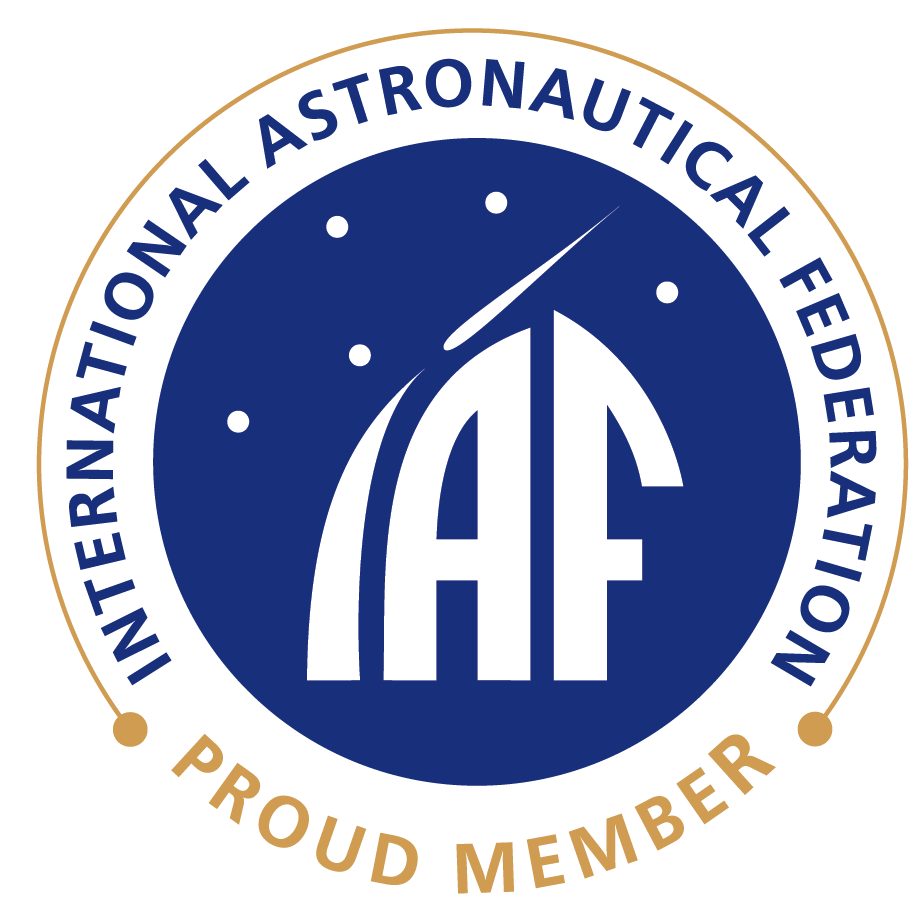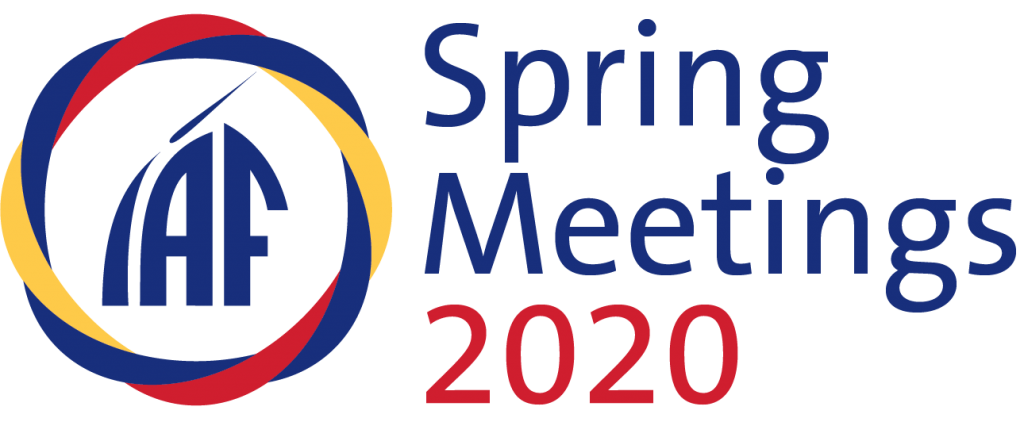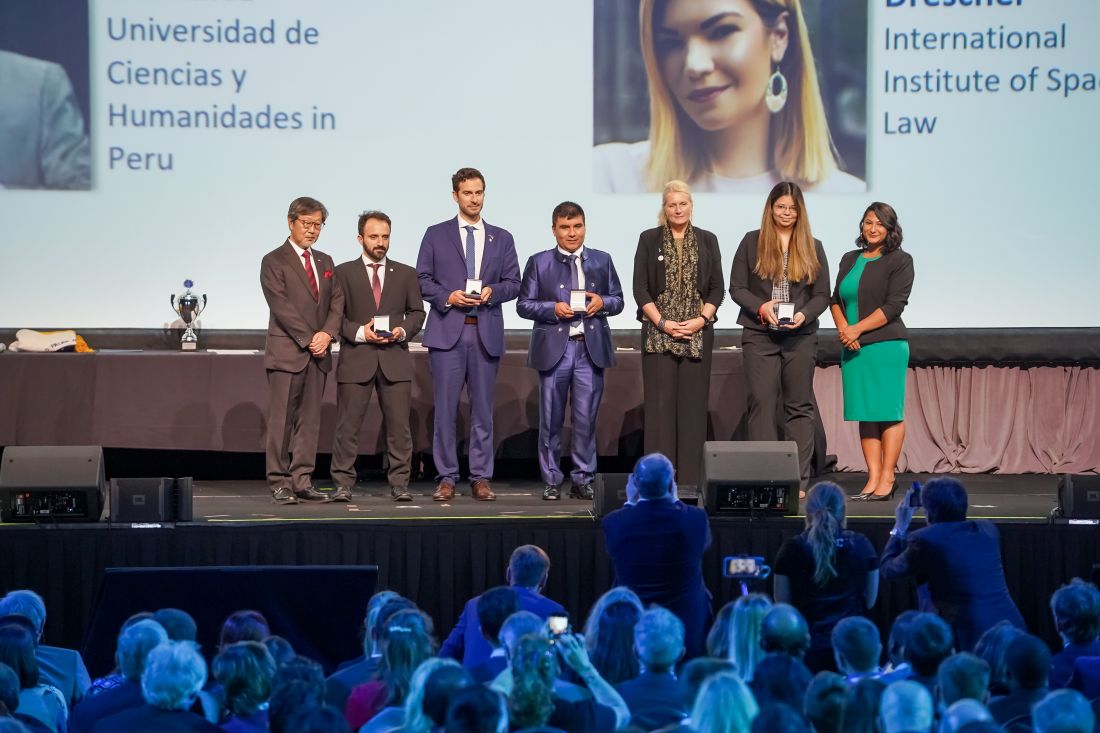Our Partnership
SGAC has been an IAF member since 2004. In 2011, IAF formally invited the Executive Director of SGAC to become an Ex-officio member of both the Space Education and Outreach Committee (SEOC) and the Workforce Development-Young Professionals Programme Committee (WD-YPP Committee). This involvement in IAF committees has been the primary interface between SGAC and IAF and has ensured more coordinated interaction between SGAC and IAF student and young professional activities. This arrangement is intended to maximise benefits to the next generation population, minimise overlap and strengthen communication between the two organisations.
In 2013, SGAC formally invited SEOC and WD-YPP Committee representatives to become full members in SGAC planning boards (Advisory Board and SGC Organising Committee). It is intended that this ex-officio membership in SGAC activities will ensure robust communication and coordination on all planned activities, especially with regard to SGC and the International Astronautical Congress (IAC). In addition to SGC, SGAC members have actively contributed to the technical and administrative committees of the IAF. IAF and SGAC agree that increased coordination through these reciprocal memberships will ensure the best use of resources of both organisations and will lay the groundwork for future opportunities for additional collaboration between IAF and SGAC.
The IAF and SGAC are pleased to have cooperated for many years. In 2018, with the development of SGAC and of the IAF initiatives focusing on generational diversity as one of the key pillars of the IAF Agenda, SGAC and the IAF have determined that entering into an even more formal cooperative arrangement would enhance their collaboration and be mutually beneficial. SGAC and the IAF will work hand-in-hand on more initiatives focusing on generational diversity and other aspects of the 3G initiative put forward by the IAF president.
Our Collaboration
IAC 2024 Next Generation Plenary Proposal
75th INTERNATIONAL ASTRONAUTICAL CONGRESS
Milan, Italy – 14-18 October 2024
Students and Young Professionals, We Want Your Input!
Apply to be part of one of the NextGen Plenary panels during the International Astronautical Congress (IAC) 2024, in Milan. Come and showcase your ideas and work in front of an audience of senior space leaders in government, industry and academia! The two proposed panels will cover these topics:
- Space for the UN Sustainable Development Goals: Making the SDGs Real by Harnessing the Power of Space for All People
- Intelligent Space: Big Data, Advanced Algorithms, and Autonomous Robotics in Space
Is your work, research, or activities related to any of the two? Read on and apply!
The NextGen Plenary – An Overview
The International Astronautical Congress (IAC), the premiere international space event, displays successes and trends of the sector through its Plenary Programme with proposals selected via competition. The NextGen Plenary (NGP) gives students and young professionals from around the world the opportunity to showcase their work and projects in front of the international space community. The plenary is a moderated conversation between the panelists and the esteemed moderator. This is an exciting opportunity that you do not want to miss!
How does the NGP Process work?
- This current document is a call for applicants to be selected as panelists for one of the two plenary proposals, being drafted by the NGP Steering Committee for submission to the IAF.
- Panelists will be selected via a global competitive process (see Application Process below) by subject matter experts to identify the best candidates and showcase the diversity of successful efforts related to the two proposal topics.
- Though both plenaries are still in the application stage, if approved, one of the proposed panels will be selected by the IAF as the Next Generation Plenary to take place during the week of 14-18 October 2024, in Milan, Italy at IAC 2024. We will be notified of the selected topic following the IAF Spring Meetings in March 2024.
- The Next Generation Plenary Steering Committee is committed to the success of both our proposed panels and in the event the plenary application process for either is unsuccessful, we will find an appropriate alternative venue for the panels during IAC 2024, as we have done since IAC 2019.
The 2024 NextGen Plenary Topics
TOPIC 1 – Space for the UN Sustainable Development Goals: Making the SDGs Real by Harnessing the Power of Space for All People
The United Nations Sustainable Development Goals (UN SDGs) were first announced in 2015 as a set of 17 goals to support global sustainability by 2030. The SDGs follow up on the UN Millennium Development Goals (UN MDGs) of 2000-2015 to become more trackable, quantifiable, and inclusive of global matters like climate change, education, gender equality, economy, and social justice.
Apart from the wider SDG topics, each topic has been tasked with SDG indicators that serve as metrics to measure progress and keep stakeholders involved & accountable. Many of these indicators track changes that are measurable from space, or can be enhanced using space-enabled platforms.
This session aims to showcase young professionals and emerging leaders who are actively involved in space initiatives that are aligned with the UN SDGs, or improve the tracking, awareness, or active engagement with the UN SDGs.
This session asks you to share your experiences related to:
- Using UN SDGs as an organizational goal or milestone, either in product/service offerings, improving internal corporate/organizational governance, or supporting interorganizational/international activities
- Being present at UN SDG-related forums to increase awareness of space platforms being used for UN SDGs
- Working on sustainability projects that fall within one of the 17 UN SDG categories
This proposed Next Generation Plenary will especially focus on examples of how space can be an enabler for global sustainability practices. Earth Observation has already enabled companies and governments to track global climate change, carbon emissions, monitor illegal maritime activities and piracy, and support wildlife habitations. Space is becoming a new domain for sustainability as more fields such as space data, communications, security, and space medicine are developed that impacts global governance (goal 16 and 17), urban design and mobility (goal 11 and 12), and health sciences (goal 3 and 6). We would love to share your work with the wider community, showcasing you and your ideas on the 2024 NextGen Plenary stage–please consider applying!
QUALIFICATION FOR TOPIC 1:
The plenary serves to:
- Highlight significant contributions to how young professionals who are involved in sustainability, or who are pushing space companies and organizations to work on sustainability practices
- Showcase unique ways in which space can be used for, or serve as platforms for, or track sustainability metrics, especially those outlined by UN SDGs and UN SDG Indicators
- Provide models in which space can be used to improve the wide areas of sustainability topics of the UN SDGs to keep the international community more informed, and ensure accountability by 2030
Panelists will be selected who demonstrate outstanding existing contributions to one or more of the following categories:
- Researching, studying, or working in fields that are space-related and focused on initiatives that are aligned with the 17 UN Sustainable Development Goals
- Are actively engaged with a project that aims to support one of the 17 UN Sustainable Development Goals
- Demonstrating an impact on improving the lives of all people from within the space sector.
TOPIC 2 – Intelligent Space: Big Data, Advanced Algorithms, and Autonomous Robotics in Space
Intelligent systems refers to the general infrastructure of using data and information to conduct sophisticated and complex operations, which includes big data, automation, artificial intelligence, and machine learning. Intelligent systems are becoming a growing cornerstone of space operations due to its increasing complexity, lack of capacity for real-time human intervention, and the huge amount of variables involved. This topic aims to highlight opportunities for harnessing automation to conduct space operations.
This session aims to showcase young professionals and emerging leaders who are actively involved in space initiatives that utilize intelligent systems, augment space operations with advanced algorithms, or conduct data-based activities in space.
This session asks you to share your experiences related to:
- Use of autonomous robotics to assist or replace human spaceflight, such as autonomous construction robots, robotic arms around space stations for EVAs, or robotic support in zero-g environments
- Creating and curating space-sourced big data systems especially in terms of data storage, data integration, data processing/accessing, and cloud computing
- Developing, managing, or utilizing advanced algorithms for spacecraft operations, such as tracking space debris, stationkeeping, redirecting space assets, and docking/launching spacecrafts in space
- Transitioning existing advanced algorithms for Earth for use in space, such as terrestrial navigation, obstacle avoidance, and object manipulation for lunar/Martian driving or construction applications
- Ensuring space data integrity such as space bandwidth management, curating inter-satellite networks, data traffic with multiple ground stations during downlink, and minimizing data loss or correcting data corruption.
This proposed Next Generation Plenary will especially focus on how intelligent systems can operate in the space environment, where there is less data, greater communication distances, and a more extreme environment for robotics systems. The plenary will also seek to hear voices from those who are interested in data-driven governance, combating data-based biases, artificial intelligence ethics, or laws, regulations, and policies of using automation for space environments. We would love to share your work with the wider community, showcasing you and your ideas on the 2024 NextGen Plenary stage–please consider applying!
QUALIFICATION FOR TOPIC 2:
The plenary serves to:
- Highlight significant contributions to how young professionals who are involved in intelligent systems (data, algorithms, robotics) are conducting projects in space (spacecraft operations, satellite data, beyond-Earth exploration)
- Showcase unique ways in which the next generation of space leaders are integrating different fields of computer science, robotics, and law/policy to make space operations more intelligent
- Identify aspects in which space operations can become safer, more inclusive, and more efficient by using intelligent systems
Panelists will be selected based on the demonstration of outstanding existing contributions to one or more of the following categories:
- Actively using or developing intelligent system components (data, algorithms, robotics) for space operations
- Engaging with various stakeholders in the intelligent systems communities (software engineers, data acquisition firms, etc) and the space domain (space agencies, satellite companies, etc.) to consider key space topics such as space sustainability, space domain awareness, space traffic management, and space exploration
- Identifying novel ways in which space systems and platforms can improve intelligent systems, such as space-based communications, space-proven robotics, or space-based data storage
Application Process
To apply, applicants must be students or young professionals between 18 and 35 years old, as of the 1st of January 2024. Applicants cannot have participated as a panelist in a previous NGP panel.
Round One
To take part in round one:
- Create a 15-second video telling us very briefly the project you are working on that connects to the themes of the panel, and why you should be selected to address the IAC.
- You must be on screen and must speak for the full 15 seconds.
- We will only watch/listen for 15 seconds, so be sure to not exceed this amount of time!
- Post your video to YouTube as an unlisted video (NOT private).
In addition to uploading your video, you must complete the Plenary Panelist Application by the deadline by filling out one of the two following forms (you cannot apply to both plenaries). Deadline for Round 1 submissions: 5th January 2024 (11:59 pm GMT)
- Topic 1: Space for the UN Sustainable Development Goals: Making the SDGs real by Harnessing the Power of Space for All People – Apply Here!
- Topic 2: Intelligent Space: Big Data, Advanced Algorithms, and Autonomous Robotics in Space – Apply Here!
Round Two
- We will select the Round Two subset of candidates from the above and notify all entrants by 30th January 2024.
Specific details of Round Two requirements will be sent to the candidates in the notification.
Selected candidates for Round Two will be asked to create and post a three-minute video on YouTube as an unlisted video (NOT private).
Deadline for Round 2 submissions: 20th February 2024 (11:59 pm GMT).
Application Guidelines
Video Details
Please record your video:
- In a high-quality audio and video format with a minimum resolution of 720p
- In a landscape orientation (horizontal)
- With limited special effects and no music: the video is about you, not your video editing skills
- Without copyrighted videos, images or music
If you are selected as a panelist, we will require the rights of your submitted videos: segments of your submissions will be used during the plenary and to promote the plenary in advance. Evaluators are looking for videos that are aligned with the theme of the plenary and that incite curiosity and interest among the viewer. P Make sure to publish your video on YouTube as an unlisted video (NOT private).
Final Selection
We will select the finalists from these entries based on their impact, efficacy of messaging, and relevance to the plenary topics; we also take into consideration the IAF’s 3G (Geography, Gender, Generation) diversity criteria.
We will be looking for concrete descriptions of how you are actively engaged with the panel topic, and why this area is vital to your work or studies. The IAF will make the final selection of plenaries for the IAC in Milan by the end of March. If you are selected for a panel, you will be coached on public speaking in preparation for the plenary including monthly meetings with the other panelists and moderator.
We will notify applicants of the final outcome by 1st April 2024.
Application Timeline
|
When |
What |
|
05 January 2024 |
Application Deadline for Round 1 |
|
30 January 2024 |
Outcome Notification to Round 1 Applicants |
|
20 February 2024 |
Submission Deadline for Round 2 |
|
End of March 2024 |
Plenary Proposal Outcome announced by IAF |
|
01 April 2024 |
Final Outcome Notification to Applicants |
Funding your IAC2023 attendance
Plenary participants will be responsible for finding their own sponsor(s) to cover for travel, accommodation, and conference tickets to attend IAC2024 in Milan. In addition to the obvious sources of sponsorship – yourself, your family, employer or school, and industry contacts – we want to share with you some programs applicable for students and young professionals (typically awarded through selection processes starting in January/February 2024):
- The IAF Emerging Space Leaders Grant Programme. See http://www.iaf-grant-programme.org/
- The Space Generation Advisory Committee (SGAC) provides travel scholarship opportunities for students and young professionals to attend the Space Generation Congress (SGC) and International Astronautical Congress (IAC). The SGC event is held prior to the IAC in Milan. Visit spacegeneration.org, and their scholarship page spacegeneration.org/scholarships for more information.
- Your national space agency and its space agency education programme. National Space Agencies provide scholarships to attend events at the IAC. You can check available scholarships here: https://iseb.space/student-sponsorship-opportunities/ or contact your national space agency. In particular, students from Europe, Japan, Korea, Canada and the United States are encouraged to contact their national space agency: ESA, JAXA, KARI, CSA and NASA respectively.
- The Future Space Leaders Foundation offers grants to students and young professionals in the United States. More information can be found at https://futurespaceleaders.org/#grant.
Contact
If you have any questions, please do not hesitate to contact nextgenplenary.iaf [at] gmail.com
Every year, the International Astronautical Federation (IAF) runs two recognition programmes for students and young professionals.
IAF Young Space Leaders (YSL) Recognition Programme
The IAF Young Space Leaders (YSL) Recognition Programme is awarded to exceptional students and young professionals, who contribute to astronautics in their academic or early careers, reach out to other young people and their communities to share knowledge and experiences, have been engaged with the international space community and contribute to IAF activities.
Applications are now closed.
Emerging Space Leaders Grant Programme
This programme enables up to 30 students and young professionals to participate in the International Astronautical Congress, and the UN/IAF Workshop or the Space Generations Congress.
As a partner of the International Astronautical Federation (IAF), SGAC is given the possibility to endorse SGAC members’ applications to the 2025 Emerging Space Leaders (ESL) Grant Programme. As in past years, SGAC has decided to endorse a limited number of its members, and we are now accepting applications.
The endorsement is a signed document by the applicant’s university, employer, an interested government agency, space or science society, or similar organisation (SGAC included).
Please note: You will have to apply for the ESL Grant via the IAF Webpage, and upload the Endorsement Letter there. Please check the ESL Grant Programme Handbook, for more details. If selected for the endorsement, you may also choose to receive one of the two required recommendation letters, by SGAC.
Who should consider applying?
Individuals interested in pursuing careers involving the development, application and use of space systems, space science research, policy, legal, social and cultural aspects of space activities, international cooperation on space programmes and other similar subjects.
Persons who – for financial, sponsorship or other reasons – would not otherwise be able to attend an International Astronautical Congress.
Young people who wish to meet and interact with other colleagues from around the world with similar interests.
Individuals who hope to utilise the knowledge and experiences they gain during the IAC in their own careers and in enhancing space and related activities in their home countries.
Applications are now closed.
Apply for a Reference Letter to the IAF Launchpad Mentorship Programme
The IAF has announced the launch of the IAF Launchpad Mentorship Programme, focused on mentorship and career development. This program pairs early- to mid-career professionals with experienced senior professionals in the space industry. The IAF Launchpad Mentorship Programme aims to facilitate career development and leadership capabilities of the Mentee and provide a platform for enhanced communication between the generations represented within the IAF.
As member organization of the IAF, the Space Generation Advisory Council (SGAC) can support the application to the IAF Launchpad Mentorship Programme, by providing reference letters to its members.
Please note: SGAC will select and support only a small pool of members among those filling the following form.
Applications are currently close
Foster the Principles of “3-G” Diversity within the Federation and the Space Sector
- Geography
- Generation
- Gender
These are the main pillars of a “3-G” Diversity principle of the Federation. Geographical diversity and global reach have been traditional features of the IAF since its creation. Attracting the young generation has been in the focus of the IAF during the recent years with manifold newly created activities and programmes tuned to this target community. This has resulted in a significant increase of the number of young people engaged and participating in IAF activities. Gender diversity is still an area where strong progress needs to be achieved. Dedicated promotion of opportunities for female space actors within the Federation and the space sector in general, presenting successful role models and encouraging the young generation of the female space community to aim for leadership positions shall help to reach a balanced and inclusive representation within the governance of the IAF, its Technical and Administrative Committees, as well as the IAC speakers’ and authors’ community.
What is Diversity?
Diversity encompassess many things – gender, age, culture, religious and political beliefs, nationality, language, academic background, heritage, and more. In the space industry it takes all kinds of people to make space exploration and the use of space possible.
“Diversity in the space industry refers to individuals of all types of backgrounds working in unity towards the success of space exploration. Diversity extends to more than cultural as it is also the appreciation of different roles within the space industry, particularly occupations that are unique and contribute towards the progress of the space sector.”
What is 3G Diversity?
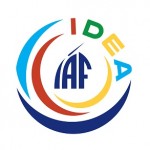
The International Astronautical Federation (IAF) has developed an initiative called the IAF International Platform for Diversity and Equality in Astronautics (IDEA) fostering the principles of 3G – Geography, Generation, Gender.
SGAC and 3G Diversity
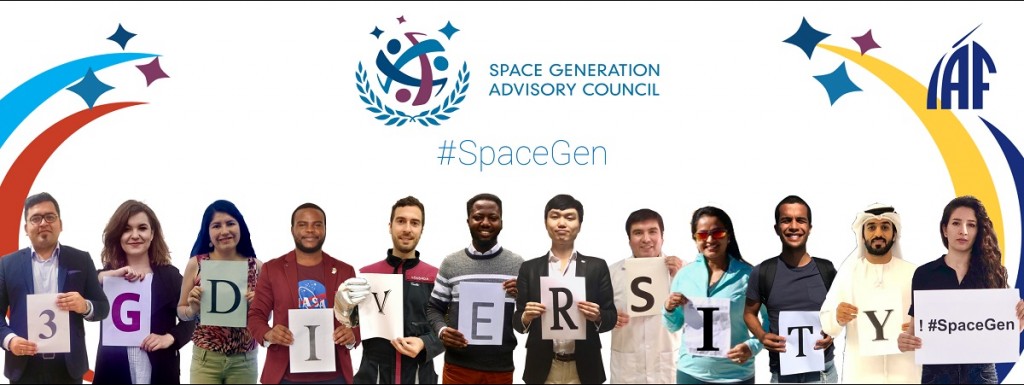
In 2018, the Space Generation Advisory Council is the recipient of the IAF Excellence in 3G Diversity Award because the organization upholds the 3Gs – Geography, Generation and Gender through its members, alumni, activities and leadership positions.
IAF and SGAC Fostering Generational Diversity
The IAC is the one time of the year when @ll space actors come together. The IAC is organised by the International Astronautical Federation (IAF). Global, multidisciplinary and covering all space sectors and topics, it offers everyone the latest space information, developments but above all contacts and potential partnerships. Each year, the IAC changes country, theme and local organiser, enabling all to learn more about, and be a part of the world space scene.
For the very first time, the IAC will open its doors to the global space community in the United Arab Emirates, the first Arab country to host the IAC since its establishment in 1950.
The Space Generation Congress (SGC) is the annual meeting of the Space Generation Advisory Council always held in conjunction with the International Astronautical Congress (IAC) at the same hosting Country. The Delegates are ~150 top university students and young professionals with a passion for space. They are selected with a highly competitive application process open to our Space Generation international network. With SGC, SGAC aims to promote the voice of the next generation of space sector leaders on the topic of international space development. The Space Generation Congress is an associated event to the International Astronautical Congress (IAC).
The International Astronautical Federation (IAF) is pleased to invite you to the Global Space Exploration Conference (GLEX) 2021 to take place in St. Petersburg, Russian Federation from 14– 18 June 2021.
The Conference, co-organized by the International Astronautical Federation (IAF) and ROSCOSMOS, will bring together leaders and decision-makers within the science and human exploration community – engineers, scientists, entrepreneurs, educators, agency representatives and policy makers. The leaders in the field will converge in St. Petersburg to discuss recent results, current challenges and innovative solutions and it will contain several opportunities to learn about how space exploration investments provide benefits as well as discuss how those benefits can be increased through thoughtful planning and cooperation.
IAF Spring Meetings
The IAF Spring Meetings gather every year in March the IAF community in Paris. For three days IAF Administrative and Technical Committees meet and the International Programme Committee selects the abstracts to be presented during the year’s IAC.
As each year, the IAF is pleased to invite you to its IAF Spring Meetings taking place in Paris, France where the IAF community will get together for three days, from 24 – 26 March 2020 in New CAP Conference Centre.
IAF Committees
The IAF Administrative Committees provide specialized advice and recommendations to the IAF, supporting the Federation’s work. They play a key role in the Federation’s internal affairs, including the provision of guidance, recommendations and related support to the IAF Bureau and the IAF General Assembly.
The IAF Technical Committees are powerful sources of knowledge. They are composed of experts and global leaders in difference fields of space activities, who discuss and anticipate the evolution of space activities.
During the IAF Spring Meetings, the committees are in charge of selecting papers presented at the International Astronautical Congress (IAC) and thereby contribute to the definition of the IAC technical programme.
The SGAC will nominate members to the different committees for their consideration.
To be nominated by SGAC, please fill out this form.
IAF Education & Young Professionals’s Activities
In accordance with its mission to prepare the workforce of tomorrow, the IAF actively supports and has a growing number of activities targeted at students and young professionals.
The nearly one quarter of attendees at the International Astronautical Congress (IAC) under 35 years testify to the success of these efforts.
The primary education activities of the IAF are:
– The Emerging Space Leaders Grant Programme;
– The Young Space Leaders Recognition Programme;
– The Young Professionals Programme;
– The IAF Student Competition;
– The Malina Astronautics Medal and Napolitano Award.
In addition, three dedicated IAF committees guide and supervise activities dedicated to students and young professionals involved in education, including the:

